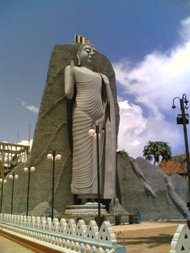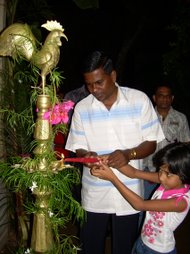Govt’s human rights record on a ‘thin divide’
The Human Rights Watch asked the EU Parliament to pass a strong resolution on Sri Lanka which would condemn violations both by the government and the LTTE and support a resolution calling for a UN human rights monitoring mission in the island.
None of these augur well for the Rajapaksa administration. The outcomes of both the controversial meeting will have a serious effect on the government’s desperate bid to obtain foreign aid. There is a serious need for the government to understand the repercussions of failing to meet certain concerns of the internatiuonal community.
The U.N. World Food Programme in May this year warned its food aid for Sri Lanka would run out within weeks, while imposing conditions, in the midst of donor concerns over fresh conflict between the government and Tamil Tigers.
The United Kingdom also suspended approximately $3 million debt relief aid to the government in early April. They too expressed concern over the human rights. The United States in May announced it had suspended an aid project based on "the security situation and the human rights situation".
Political Panorama
By Shakuntala Perera
It would help the country to be attuned to global sensitivities. The government needs to be mindful of the increasing concern of the international community towards the situation in the North and East. Such concerns have been intimated to the government at various international forums. Diplomatic sources stress that these have not been heeded. They add that there will be consequences.
Tuesday’s debate on Sri Lanka’s human rights situation at the European Union is only a further step in this direction. Much of the debate was based on the recently released report by the New York based Human Rights Watch (HRW).
Foreign Ministry sources revealed that the government team which included the EU parliament Sri Lankan representative Niranjan Devaditta, ‘had little time’ to prepare for the debate. This was feared as a reason to fear the outcome. The government had lobbied support from EU countries to prevent any resolution being brought against Sri Lanka following the debate.
The timing of the debate was also not favorable to Sri Lanka. The UN Human Rights Council (UNHRC) is also meeting in Geneva.
UNHRC started its latest sittings yesterday at the Palais des Nations to discuss issues on promoting and protecting human rights and the Human Rights Watch was strongly believed to have submitted a private letter to the council relating to the human rights concerns in Sri Lanka. A Tamil Rights Group is also expected to hand over a document on the situation in the North and the East at the sessions today.
The intentions are clear. The Human Rights Watch asked the EU Parliament to pass a strong resolution on Sri Lanka which would condemn violations both by the government and the LTTE and support a resolution calling for a UN human rights monitoring mission in the island.
None of these augur well for the Rajapaksa administration. The outcomes of both the controversial meetings will have a serious effect on the government’s desperate bid to obtain foreign aid. There is a serious need for the government to understand the repercussions of failing to meet certain concerns of the international community.
The fresh moves come in the midst of reports that the donors are asking for a post conflict resolution from the Sir Lankan government and the LTTE before funding would be released to the government’s proposed development projects. The donor agencies in Sri Lanka were strongly believed reluctant to give money to the Dawn of the East programme of the government because of fear that renewed violence would destroy the development work and ‘waste their taxpayer’s money.’
"Only a few agencies have come forward to lend money. The others want a resolution from the parties. They are concerned the money they give may go to waste if fighting breaks out again in the east," a donor source was quoted by agency reports. The funding agencies have also raised concerns over the activities of the Karuna paramilitary group in the region as another threat to development work.
The U.N. World Food Programme in May this year warned its food aid for Sri Lanka would run out within weeks, while imposing conditions, in the midst of donor concerns over fresh conflict between the government and Tamil Tigers.
The United Kingdom also suspended approximately $3 million debt relief aid to the government in early April. They too expressed concern over the human rights. The United States in May announced it had suspended an aid project based on "the security situation and the human rights situation".
Foreign Minister Rohitha Bogollagama, himself admitted that there was a ‘negative sense’ prevailing right now in ‘all these circles’.
“But I don’t think the result will be negative even if the debate is. There are always two stages in a debate of this nature. They will first go straight off into the ultimate conclusions, and then they will stop short of that and look at optional arrangements. We can always play within these two determinations,” he added.
“We should be okay,” he added.
He was mindful that ‘these complaints’ against the government arise out of ‘falling short’ of what is required of a government by these international agencies. He opined that the ‘concern’ and ‘attention’ depended largely on the fact that EU assistance receiver countries were expected to fall within ‘so-called yard stick that they measure us from’.
‘That is how these complaints arise. Sometime when you explain matters they tend to take a different line and their perceptions get changed. This is what we are trying to do. This thin divide between what has to be looked into and what is meant to be looked at is very important. It is a fine divide which is sometimes difficult to handle, unless you have one to one discussions,’ he added.
He complained of ‘new schools’ of the international community was affecting sovereignity of states as a result. ‘It has built up a new school of thought that there are rights to interfere on behalf of the world community irrespective of the sovereignty of the States.
“This is why some of these NGOs want to look at the degree to which you can look in to the affairs of a sovereign nation. But above all is the international good order conduct that we all belong to. If the international community is concerned in this respect then it is our responsibility to be proactive to these concerns,” he added.
It is in fact the government’s failure at such pro-active measures that has pushed it to the corner today. And the failure to understand the backdrop to concerns of a global nature.
In a statement to the EU Parliament which convened in Brussels, HRW researcher Charu Lata Hogg said while disappearances and abductions showed a ‘temporary’ lull in Colombo, in the rest of the country, families continued to report abductions of relatives by unknown persons.
The National Human Rights Commission in Jaffna reported that in the first three weeks of August alone, 21 cases of enforced disappearances and 13 cases of unlawful killings had taken place. “On September 3, the ICRC reported that in the previous three weeks, it had documented 34 such abductions countrywide,” Hogg told the EU Parliament.
HRW blamed that the government has been ‘unable or unwilling’ to stem the tide of ongoing human rights violations by state forces.
“In June, Sri Lankan police arrested 16 people, including four policemen and a member of the Air Force, in connection with the spate of burgeoning abductions, and claimed to have broken the back of the racket. As our report shows, government security forces have been implicated in enforced disappearances, forcible returns of internally displaced persons to unsafe areas, restrictions on the media that undermine press freedom, apparent complicity with the abusive Karuna group, and widespread impunity for serious human rights violations,” Hogg said.
Human Rights Watch was however also critical of the use of children by the LTTE. HRW also expressed concern over coercive fundraising tactics in Canada and the UK, as well as targeted killings and other serious violations of Sri Lankan and international law.
“We have called for the UN to impose targeted sanctions against the LTTE due to its repeat offender status with regard to child soldiers,” she said.
Diplomatic sources also maintained that Minister Bogollagama had been given an ultimatum till January by French Foreign Minister Bernard Kouchner in Paris recently, to improve the country’s human right’s situation. According to these sources the French FM had expressed criticism on the situation in the North and the East. He had expressed ‘keenness’ to see the situation improved by January when he is expected to visit Sri Lanka.
Kouchner is considered an important figure in the EU developments on Sri Lanka.
Whatever the excuses delivered by the government the fact remains that the situation in the North and East are far from healthy. In Mannar at least 12 civilians were reported killed following the latest military operations in the area. According to UNHCR more than 3,000 people have fled their homes in Mannar to escape fresh fighting between government troops and the LTTE.
This is aside of the thousands rendered homeless in the East following government’s recapture of the province. Months after the capture thousands of the displaced are languishing in camps with no hope of change. Change; that takes the greater good of the citizens of the country as a priority.
"Star Lanka Online" Our NEW Web site And Web TV Channel Launched
TFGE , The Future Global Educational Center Has Launched
the official web site, called
*** Star Lanka Online Dot Com ........................
www.starlankaonline.com will be completed in very near future....
*** Star Lanka Online TV Channel,..................
Just One Click ahead ...
Now you can watch "Star Lanka Online TV" channel broadcasts from Matara, Sri Lanka in most part of the day. Still we are keeping a test transmission also. There is a link right side of your hand to watch our TV channel. You can watch (Click On the Box) live channel on this site without going to another site to watch the TV. and also recorded parts, following the below link.
the official web site, called
*** Star Lanka Online Dot Com ........................
www.starlankaonline.com will be completed in very near future....
*** Star Lanka Online TV Channel,..................
Just One Click ahead ...
Now you can watch "Star Lanka Online TV" channel broadcasts from Matara, Sri Lanka in most part of the day. Still we are keeping a test transmission also. There is a link right side of your hand to watch our TV channel. You can watch (Click On the Box) live channel on this site without going to another site to watch the TV. and also recorded parts, following the below link.
Place your Own Ad Here
Thursday, September 13, 2007
Govt’s human rights record on a ‘thin divide’
Posted by
Priyantha De Silva
at
2:26 AM
![]()
Subscribe to:
Post Comments (Atom)





















































No comments:
Post a Comment